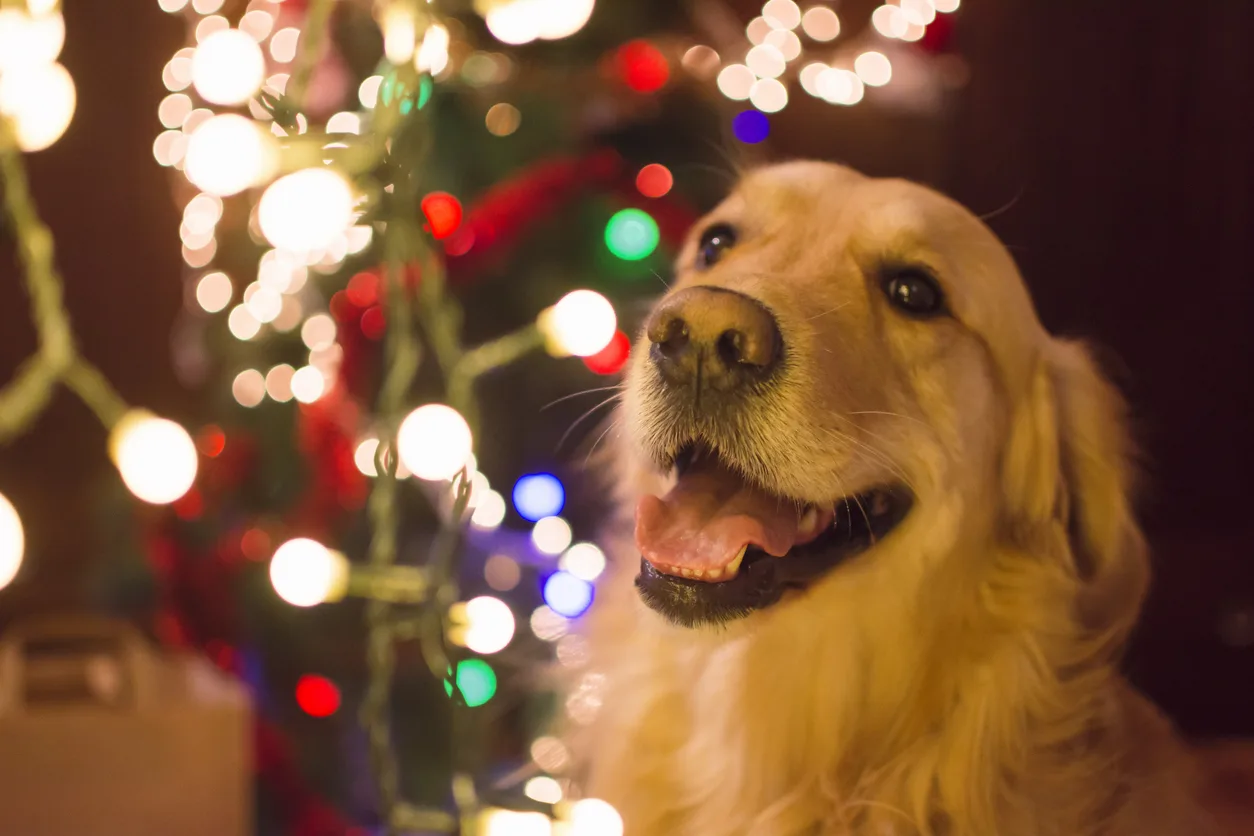The holiday season is such an incredibly fun time of year. It’s easy to get wrapped up in all of the ribbons and bows, chocolates and cookies, and extra fun activities (see this video as a cute example). But there’s a catch in all this fun-having; you need to make sure you’re keeping an extra careful eye on your pets. Some of the things we take for granted at this time of year can be dangerous to your furry friends.
As you decorate for the holidays, keep in mind the hidden dangers that could harm your four-legged family members. Several seasonal items pose severe dangers to your dog. Nothing will spoil the celebrations more than a trip to your local veterinary emergency room. Use these tips to keep your dog safe.
Christmas Trees
If you’re celebrating Christmas with a tree (real or fake), secure it by tying it to the ceiling, the wall, or the floor. Curious pups and climbing cats love to knock trees over; taking this one step will prevent them from causing an avalanche of damage to your pretty living room and themselves. Wagging tails and curious cats may require you to re-fluff from time to time, but you won’t spend everyday standing the tree up, redecorating, and cleaning up broken pieces.
Putting lights on the tree? Avoid the lower branches. Your pets are more likely to get tangled in the lights on the lower branches, even by accident. Even indoor lights can become hot enough to cause uncomfortable burns if a tangled pet gets stuck among them for too long. Furry companions may also try to chew the wires, causing electrocution.
Ornaments
Keep your pet in mind when decorating your house with shiny ornaments or tinsel. Animals can be attracted to the sparkle of the decorations and mistake them for toys. Playing with these objects could pose a huge choking hazard for household pets. If your dog happens to digest a foreign object, such as tinsel, it can become caught in the animal’s intestines. This could have fatal consequences.
Tinsel & Ribbons
Tinsel may be pretty on the tree, but it can cause serious issues in your dog or cat. The sharp edges can cause cuts in the intestines and/or it can cause obstruction. If you notice symptoms such as vomiting, diarrhea, weight loss, or decreased appetite, make sure to bring the dog in for medical help.
Keep a careful eye on your pets and tinsel and ribbon. Many animals (but especially puppies and kittens) find shiny objects incredibly tempting and compelling. They’ll play with them and chew them up, raising the risk of canine intestinal blockages.
An intestinal blockage is no joke. Best-case scenarios see the object pass with a whole lot of uncomfortableness, pain, and vomiting. But blockages can quickly grow in size; if they do, your pup could wind up having an expensive removal surgery.
Shiny tree ornaments are also a concern, especially if they’re made of breakable glass or even sharp plastic. Curious pets often knock them off of the tree. Then, they hit the ground and shatter. This won’t necessarily cause them to lose interest; they don’t know the knowledge to know that biting those pretty shards will lead to mouth cuts (or worse, intestinal perforation).
Mistletoe, Holly & Holiday Plants
A lot of seasonal plants are very decorative and smell great, but they’re also dangerous for your pets. Holly can cause serious GI issues while mistletoe can cause both GI and heart issues. Poinsettia and other plants are toxic. The ASPCA has a complete list of plants that are toxic to animals. It’s safer to incorporate artificial plants into your holiday decor rather than risk a sore tummy or illness.
Hosting Safe Parties
Are you in charge of this year’s holiday party or dinner? Make sure your pets have a safe, warm, quiet place to hang out if (when) they need to get away from all of the extra human interaction. Even the most friendly of animals can get overwhelmed when strangers and extra visitors constantly enter their space. Things get noisy, people are moving around unpredictably. There may even be extra little humans trying to play with or touch them. Create a safe space away from holiday party traffic and give your pets a chance to chill if they seem to be getting anxious.
This is a great time to update your pet’s collar and/or microchip information. An increase in guests raises the risk for an escapee to dash out the door. Double-checking your personal details and ensuring they’re correct improves the chances that shelter or pound staff can help you reconnect if you can’t corral them right away.
Foods
It’s tempting to feed dogs and cats table scraps (puppy dog eyes are a real thing). There’s nothing wrong with a few treats here and there – a piece of white meat turkey, or a tiny slice of cheese – but do try not to let your pets overindulge. Overeating makes pups experience indigestion, but may even lead to severe GI symptoms.
Make sure your guests know not to indulge your begging pups without your permission, especially if they’re feeding foods high in fat (including chicken and turkey skin), gravies, and other overly-rich table scraps. Vets see an increase in critical canine pancreatitis cases for this exact reason!
Some types of nuts are also considered extremely toxic to pets. Macadamia nuts, found in a large amount of holiday desserts, can cause a dog to lose muscle control and experience other serious symptoms. While other nuts may not cause severe illness, there is always a risk that a nut can become stuck in intestines or cause stomach discomfort. It is best to keep all nuts away.
Lastly, don’t forget that it isn’t always you or your friends raising the risk. Clear away scraps, strings, and packaging and make sure your trash cans are properly secured.
Sweet Treats
Christmastime is filled with delicious sweets like baked goods, homemade candies, and processed desserts. A curious pup can easily carve through an entire batch of cookies in just a few minutes, leading to one heck of a sore tummy. The sugar itself isn’t good for them, but sweets made with xylitol can be especially toxic, causing diarrhea and vomiting that may lead to dehydration. Chocolate is especially problematic; it’s toxic to both dogs and cats, too, and dogs who ingest it can become seriously ill or even die.
The holidays are a time for indulging treats, but some of these delicious foods could be deadly to your dog. Many people know the danger of this sweet treat. Dogs will suffer a variety of symptoms depending on how much and what kind of chocolate they ingest. From vomiting and diarrhea to seizures and death, keep this major holiday staple away from your pet.
Fire & Flames
It is the season for creating a roaring fire in the fireplace, but make sure to put safety first. An open flame’s heat could attract an animal who wants to get warm and cozy. Although,it is fine for your dog to curl up by the fire, make sure they don’t get too curious and get close enough for burns.
The same goes for candles. Keep any open flames out of your pet’s reach. Not only could they burn themselves, but they could also knock them over causing a fire. Also, spilled hot wax from the candles can cause severe burns as well.
Don’t Leave Candles Unattended
Candle safety is a huge concern year-round, but there are always extras lying around during the holidays. Keep an eye on your pets to make sure they stay far away from lit candles. Dogs and cats are often intensely curious about that pretty moving flame, and may try to sniff or otherwise explore it…leading to nose burns and singed fur. Playful pups can also accidentally come to close while playing, knocking it over with the swoosh of a tail; if it happens to land on something flammable, you might be looking at a house fire.
To lower the risk, turn to LED candles instead. If you choose real candles, be sure to extinguish them anytime you leave the room. Put the lids on, if you have them, to prevent melted wax from spilling before it solidifies again.
Electrical Wires
You may find yourself using extension cords and electrical wires as you find a way to accommodate all of those Christmas lights and electric-powered decorations. Make sure to keep these wires out of your dog’s sight, especially if they are prone to chewing. A single bite into a electrical wire could cause electrocution, injury to the animal’s mouth and even death. Keep your animal’s curiosity at bay by tying up extra cords and keeping them out of reach. This will help keep your dog safe.
Anti-Freeze & Ice-Melting Chemicals
In cold weather you may have anti-freeze around, and this is extremely toxic to dogs and cats. It has a sweet taste that seems to be pleasurable to them, but it can be lethal even in small quantities. If your dog has ingested any anti-freeze make sure to get him or her to a vet right away because it is considered to be an emergency.
Take extra care if you use salt or chemicals on icy roads and sidewalks. Your dog’s footpads are extremely sensitive to these and burning can occur. Try to keep your dog off of these substances, and if he does happen to walk in it, make sure you wash the footpads off thoroughly when you return home.
Hypothermia
Being in cold weather for long periods of time is also dangerous for dogs. Hypothermia can occur once the internal temperature drops below around 96 degrees, and this is a risk to a dog’s safety. Dogs with short hair and those who are smaller should be bundled in sweaters and booties when outside, and shivering is a sign that a dog should be taken inside right away.
Don’t Forget the New Year
Holiday festivities don’t end at Christmas; they extend all the way to New Year’s Day. This yearly celebration can cause safety concerns, too. Most animals absolutely do not like the sound of fireworks, firecrackers, yelling, or banging pots and pans – all of which are endemic to the midnight celebration on New Year’s Eve.
Dogs who bark during these events aren’t necessarily barking out of enjoyment or to lend their participation. They’re upset, irritated, or even afraid. Give your pets a quiet safe place to escape – a crate or quiet room works best. Turn on the TV or some other sort of friendly noise to drown out scary noises.
Don’t leave your pets outside alone, especially on New Year’s Eve. Make sure they’re on leashes at all times when you are outdoors. People love to randomly set off firecrackers throughout the entire week leading up to the New Year, so you never know when your pet may be startled.
Your pets want to be with you just as much during the holiday season as they are throughout the rest of the year — even more if you have extra time off of work. Make sure you’re conscious of their participation in your festivities and take precautions to keep them safe. Happy Holidays!
Enjoy the festivities, but keep these safety tips in mind when decking the halls and you can help keep your dog safe this holiday season.

